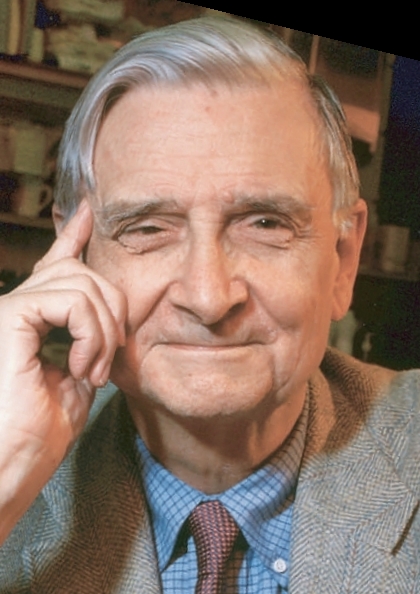“Sosterrò che ogni frammento di diversità biologica è inestimabile.”
Origine: Citato in AA.VV., Il libro dell'ecologia, traduzione di Roberto Sorgo, Gribaudo, 2019, p. 149. ISBN 9788858024362
Edward Osborne Wilson è un biologo statunitense.
Si è occupato di vari temi di ricerca, quali la mirmecologia , la biodiversità e la sua distribuzione, attraverso la formulazione della teoria della biogeografia insulare. È noto in particolare per la fondazione del programma di ricerca della sociobiologia. È autore di numerosi saggi, due dei quali hanno ottenuto il Premio Pulitzer per la saggistica.
Wikipedia

“Sosterrò che ogni frammento di diversità biologica è inestimabile.”
Origine: Citato in AA.VV., Il libro dell'ecologia, traduzione di Roberto Sorgo, Gribaudo, 2019, p. 149. ISBN 9788858024362
Origine: Citato in AA.VV., Il libro dell'ecologia, traduzione di Roberto Sorgo, Gribaudo, 2019, p. 146. ISBN 9788858024362
Origine: Citato in AA.VV., Il libro dell'ecologia, traduzione di Roberto Sorgo, Gribaudo, 2019, p. 148. ISBN 9788858024362
Gaia Atlas of Planet Management
Origine: Consilience: The Unity of Knowledge (1998), p. 262.
“The evolutionary epic is probably the best myth we will ever have.”
On Human Nature (1978)
“The borderline between normal and schizophrenic people is broad and nearly imperceptible.”
On Human Nature (1978), Ch.3 Development
“The emergence of civilization has everywhere followed a definable sequence.”
On Human Nature (1978), Ch.4 Emergence
Origine: Letters to a Young Scientist (2013), chapter 16, "Searching for New Worlds on Earth", page 177.
“To know how scientists engage in visual imagery is to understand how they think creatively.”
Origine: Letters to a Young Scientist (2013), chapter 5, "The Creative Process", page 69.
The Diversity of Life
“This planet can be a paradise in the 22nd century.”
Statement quoted at the "TED Prize" website, which he won in 2007 http://ted.com/tedprize/winners2007.cfm
Talk at the 50th anniversary of New Scientist magazine (2006).
Origine: Consilience: The Unity of Knowledge (1998), p. 264.
Biophilia (1984)
“The incest taboo is another major category of primed learning.”
On Human Nature (1978), Ch.3 Development
Origine: Consilience: The Unity of Knowledge (1998), p. 245.